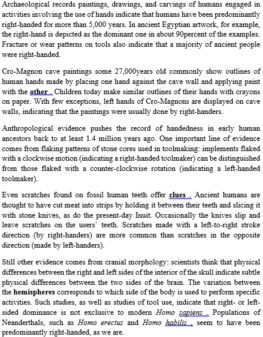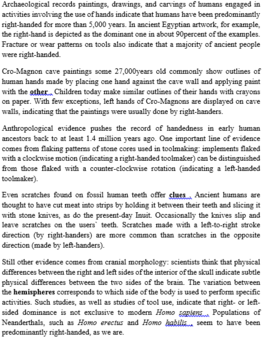Read the following passage and mark the letter A, B, C, or D on your answer sheet to indicate the correct answer to each of the questions from 36 to 42.
The Internet is very much like television, in which it takes time away from other pursuits, provides entertainment and information, but in no way can compare with the warm, personal experience of reading a good book. This is not the only reason why the Internet will never replace books, for books provide the in-depth knowledge of a subject that sitting in front of a computer monitor cannot provide. We can download text from an Internet source, but the aesthetic quality of sheets of downloaded text leave much to be desired. A well-designed book enhances the reading experience.
The book is still the most compact and inexpensive means of conveying a dense amount of knowledge in a convenient package. The easy portability of the book is what makes it the most user-friendly format for knowledge ever invented. The idea that one can carry in one's pocket a play by Shakespeare, a novel by Charles Dickens or Tom Clancy, Plato's Dialogues, or the Bible in a small paperback edition is mind-boggling. We take such uncommon convenience for granted, not realizing that the book itself has undergone quite an evolution since the production of the Gutenberg Bible in 1455 and Shakespeare's First Folio in 1623, just three years after the Pilgrims landed at Plymouth to colonize the New World.
Not only has the art and craft of printing and book manufacturing been greatly improved over the centuries, but the great variety of subject matter now available in books is astounding, to say the least. In fact, the Internet requires the constant input of authors and their books to provide it with the information that makes it a useful tool for exploration and learning.
Another important reason why the Internet will never replace books is because those who wish to become writers want to see their works permanently published as books - something you can hold, see, feel, skim through, and read at one's leisure without the need for an electric current apart from a lamp. The writer may use a word processor instead of a typewriter or a pen and pad, but the finished product must eventually end up as a book if it is to have value to the reading public. The writer may use the Internet in the course of researching a subject just as he may use a library for that purpose, but the end product will still be a book.
The author mentioned the Internet in the last paragraph as a tool that
A. will replace books if the writers don't want to publish their works.
B. requires more equipment to use than books.
C. provides the writers information about the subject they are finding for their books.
D. cannot be held, seen or felt in our hands.





Đáp án C
Tác giả đề cập đến Internet trong đoạn cuối như là một công cụ mà _____.
A. sẽ thay thế sách nếu tác giả không muốn xuất bản tác phẩm của họ.
B. yêu cầu nhiều thiết bị để sử dụng hơn là sách.
C. cung cấp cho tác giả những thông tin về chủ đề họ đang tìm kiếm cho cuốn sách của họ.
D. không thể bị cầm, nhìn thấy hay cảm nhận được trong tay chúng ta.
Căn cứ thông tin đoạn cuối:
Another important reason why the Internet will never replace books is because those who wish to become writers want to see their works permanently published as books - something you can hold, see, feel, skim through, and read at one's leisure without the need for an electric current apart from a lamp. The writer may use a word processor instead of a typewriter or a pen and pad, but the finished product must
eventually end up as a book if it is to have value to the reading public. The writer may use the Internet in the course of researching a subject just as he may use a library for that purpose, but the end product will still be a book.
(Một lý do quan trọng khác tại sao Internet sẽ không bao giờ thay thế được sách là bởi vì những người muốn trở thành nhà văn muốn xem tác phẩm của họ được xuất bản vĩnh viễn dưới dạng sách - một thứ bạn có thể năm giữ, xem, cảm nhận, đọc lướt qua và đọc giải trí mà không cần dòng điện ngoài một chiếc đèn. Người viết có thể sử dụng bộ xử lý văn bản thay vì máy đánh chữ hoặc bút và giấy, nhưng sản phẩm hoàn chỉnh cuối cùng phải kết thúc dưới dạng sách nếu nó có giá trị cho cộng đồng đọc sách. Nhà văn có thể sử dụng Internet trong quá trình nghiên cứu một chủ đề giống như ông có thể sử dụng một thư viện cho mục đích đó, nhưng sản phẩm cuối cùng vẫn sẽ là một cuốn sách.)